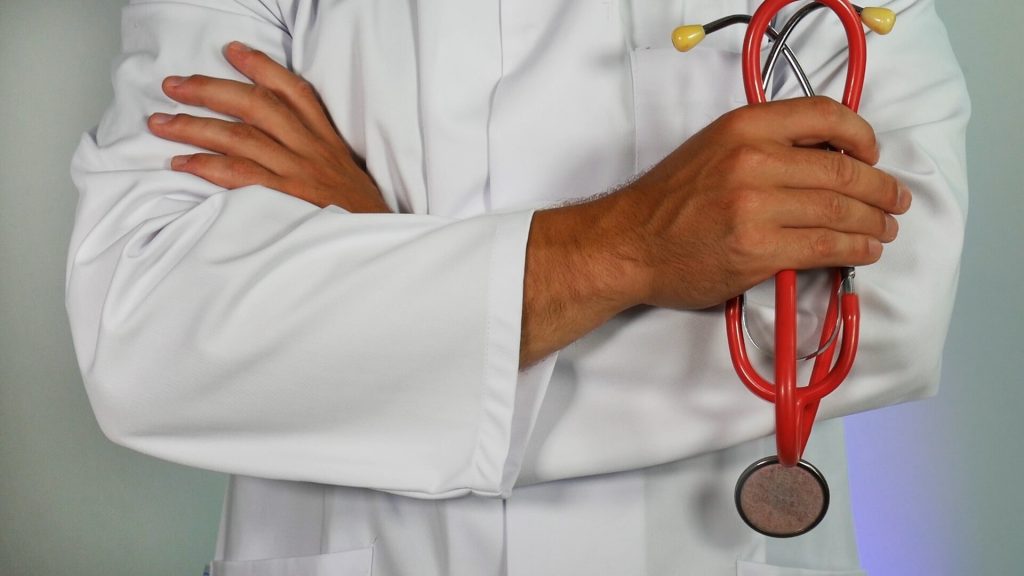Simple conversation between doctor and patient in Italian
Are you waiting for a visit to a doctor in Italy? Or maybe you are in the process of learning Italian and need another lesson? We have prepared an Italian dialogue with a doctor, which will be helpful for all who travel, but also recall the vocabulary for those who are learning Italian. This is a very practical lesson – you will learn the expressions that are used and heard from the doctor. Among other things, you will learn how to describe your symptoms and how to get a prescription. These phrases will surely come in handy in your life. Take advantage of our online lesson – simple conversation between doctor and patient in Italian – and be sure that in case of any health problems you will reach an agreement with a doctor in a foreign country 🙂 After watching our film – At the Doctor’s – a medical visit will not be a problem for you!
Phrases used in the video:
– Good morning. I’m here on holidays and have been feeling quite sick, so I need to see a doctor. Could I make an appointment? (Buongiorno. Sono qui in vacanza, mi sento molto male e ho bisogno dell’aiuto di un medico. Posso fissare un appuntamento?)
– Good morning. Do you have health insurance? (Buongiorno. Ha l’assicurazione medica?)
– Certainly, I bought travel insurance for the duration of the trip. (Certo, ho comprato un’assicurazione di viaggio per tutta la durata del viaggio.)
– Wait a moment, I’ll ask the doctor if she’ll see you. (Aspetti un minuto, chiederò al medico se accetterà di riceverla.)
– I’d be obliged. (Le sarei molto grato.)
– The doctor will see you today. May I see your ID, please? Sarà ricevuto oggi. Posso chiedere la sua carta d’identità?)
– Great! Here you are. (Ottimo! Prego.)
– Thank you. Please, take a seat and wait in line. (Grazie. Si sieda per favore e prendere posto in coda.)
– Who’s next in line? (Signori, chi è il prossimo in fila?)
– I am. (Io.)
– Come in, please. (Prego, entri per favore.)
– Good morning. (Buongiorno.)
– Good morning. Please, take a seat. What’s the matter? (Buongiorno. Si sieda. Che succede? )
– I have a severe stomach-ache and headache, loss of appetite and obnoxious cough. (Ho un dolore forte allo stomaco e alla testa, inoltre, non ho appetito e ho la tosse.)
– How long have you been feeling unwell? (Da quando ha questi sintomi?)
– For two days. (Da due giorni.)
– I understand. Did you vomit? (Capisco. Ha vomitato?)
– Yes, I vomited last night and my muscles have been sore since then as well. (Sì, ho vomitato ieri sera e da allora sento anche il dolore dei muscoli.)
– Have you experienced any other health problems? (Ha notato altri disturbi?)
– I am feeling very weak and it’s hard for me to focus. (Mi sento molto debole e ho difficoltà a concentrarmi.)
– Good. My first question is, do you suffer from any chronic diseases? Are you taking medication on a regular basis? (Bene. Innanzitutto devo chiederle: ha qualche malattia cronica? Prende farmaci abitualmente?)
– No. I do experience problems with my blood pressure, but today my pressure was normal. (No. Ho problemi di pressione, ma l’ho misurata oggi ed i valori erano normali.)
– I understand. I’ll take your temperature. (Capisco. Le misuro la temperatura.)
– You have a fever, that’s why you’re weak. The reading on the thermometer showed 39 centigrade. Please stand up and lift your shirt up. – I will perform and exam on your abdomen and will listen to your chest. (Ha la febbre, ecco perché si sente debole. Il termometro ha mostrato 39 gradi. Si alzi e sollevi la maglietta. Esamino la sua pancia e ausculto i polmoni.)
– Good. (Bene.)
– Does it hurt? (Le fa male?)
– No. (No.)
– Ok, please take a seat. Lungs and bronchi are fine. Nothing alarming in the abdomen either. (OK, può sedersi. I polmoni e i bronchi vanno bene. Non c’è nulla di preoccupante nemmeno nell’addome.)
– Thank you. (Grazie.)
– You probably got food poisoning from the local food. I will write you a prescription, please buy the medicine and take it twice a day, morning and evening. If after three days you will not feel better, please call me. (Probabilmente è un’intossicazione alimentare con cibo locale. Le scriverò una prescrizione, per favore compri questa medicina e la prenda due volte al giorno, al mattino e alla sera. Se dopo tre giorni i sintomi persistono, la prego di contattarmi telefonicamente.)
– Is there anything else I should do to feel better? (Dovrei fare qualcos’altro per sentirmi meglio?)
– Please, rest in bed today, drink plenty of water and stay on a light diet. The fever should go away after the first dose of the medicine. (Si riposi a letto oggi, beva molta acqua e mangi dei pasti semplici e facilmente digeribili. La febbre dovrebbe passare dopo la prima dose di medicinale.)
– Thank you for your help. (Grazie per il suo aiuto.)
– You’re welcome. Please pick up your prescription in the reception area. (Prego. Può ritirare la sua prescrizione presso la reception.)
– Of course! Goodbye! (Certo. Arrivederci!)
– Goodbye! (Arrivederci!)
– I’d like to pick up my prescription. (Vorrei ritirare la prescrizione.)
– Here you are. Please find our business card enclosed, you can use the phone number to call the doctor. (Prego. Allego anche un biglietto da visita, dove troverà il numero di telefono del medico.)
– Thank you very much. Goodbye! (Grazie mille. Arrivederci!)

For more, visit our YouTube channel and see also our food vocabulary Italian lesson.





